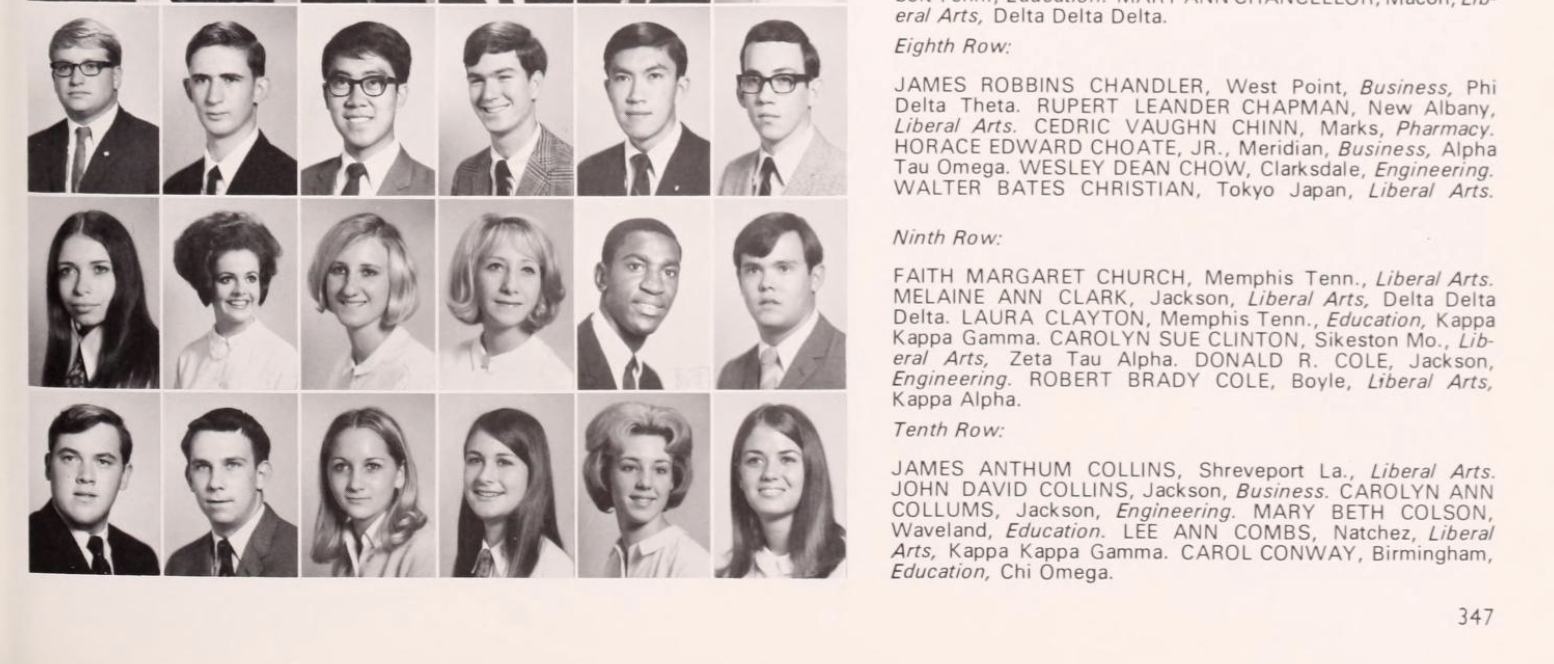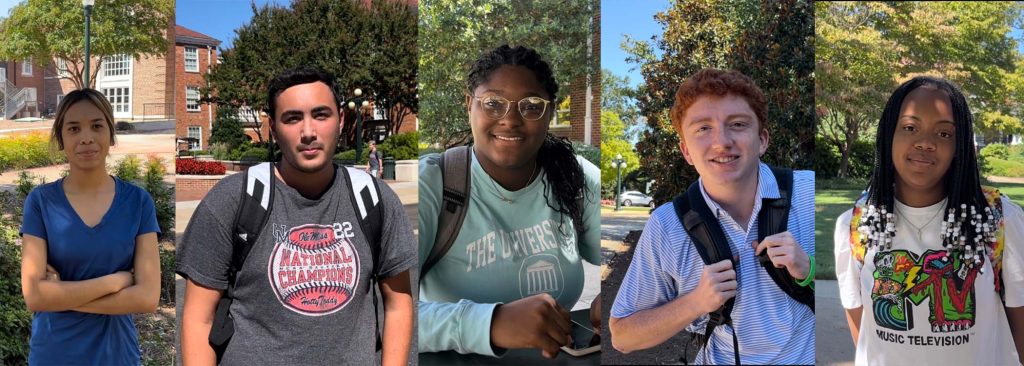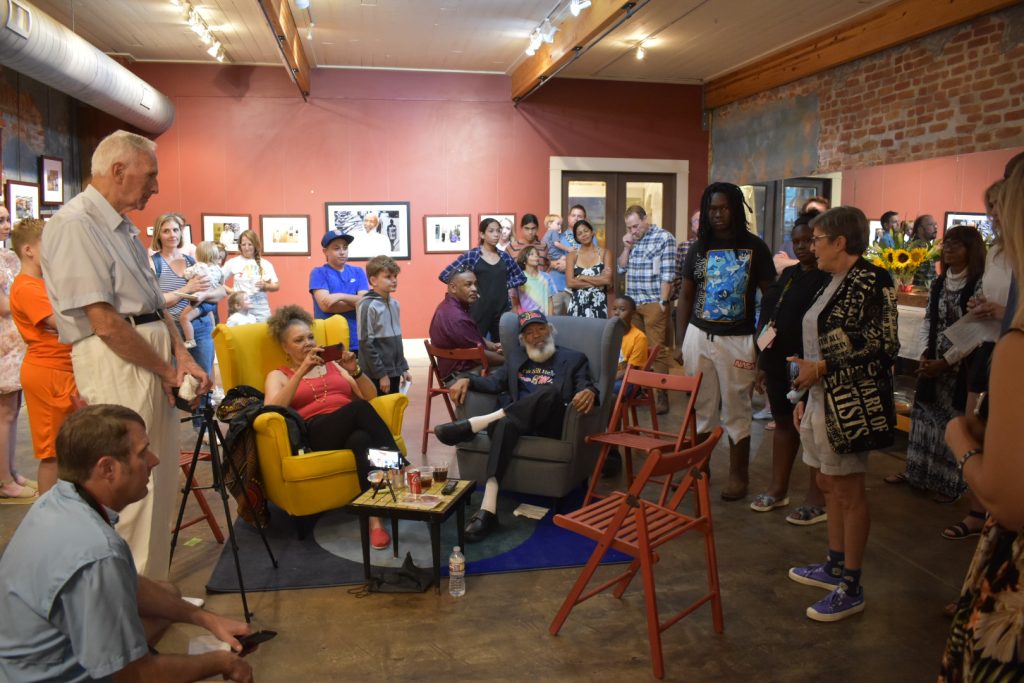As a young woman with roots in the nearby cities of Holly Springs and Memphis, it was an easy choice when it came time for Nichelle Robinson to choose where to attend college.
Robinson’s parents graduated from Ole Miss, and that’s where she would go, too.
As a campus resident assistant, part of the Honors Society and a sophomore leader for the chancellor’s leadership class, Robinson proudly spoke of her alma mater and extended that pride to the bigger changes happening on UM’s campus during her undergraduate tenure from 1987 to 1991.
Those changes started in 1982.
In 1982, UM’s first African American cheerleader, John Hawkins, refused to carry the Confederate flag that was a long-standing symbol at Ole Miss athletic events. Four years later, the Confederate flag was replaced at games by a blue flag with a capital M.
Hawkins played an important role at UM and left a legacy. While Robinson might remember his name, there are many students who have never heard of him.
Like Hawkins, there are countless African American students who over the years have pushed for change and advancement on campus and whose names are often lost to the archives and history books.
Robinson, who went on to graduate with her Master’s of Education and Ed.D. from UM, noted that loss.
“There was always a remembrance of James Meredith,” Robinson said. “But I will be honest in saying that I was not introduced to the other students (who came after James Meredith) until my time on campus as faculty and being the diversity officer in the school of education.”
Integration at the University of Mississippi may have started with James Meredith, but the fight for an open society has been in the hands of many other African American students whose names deserve to be remembered and stories deserve to be told.
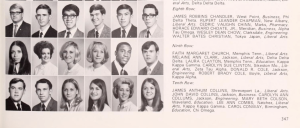
Donald Cole
Donald Cole is one of those students. Although he is well known on campus for his many years of service as a professor, mentor and assistant to the chancellor for multicultural affairs, some might not know his full history with the university.
Before returning to complete his Ph.D. in Mathematics, Cole attended the university as an undergraduate from 1969 to 1970, but his experience was cut short.
Cole was one of the African American students who built a community among themselves, sharing almost every meal together.
“We were all uncomfortable, and so we quickly found comfort in others,” Cole said. “We all expressed concerns about the university to one another, and we would debrief daily about the incidents that would happen and take place. Everything from physical incidents to harassment.”
Eventually, the group gave themselves a name.
After its official incorporation on March 25, 1969, the Black Student Union hosted a series of protests, many of which were during Black History Month in 1970.
Among the first was a cafeteria sit-in on Feb. 24, 1970, in the student dining hall where each member of BSU took over a separate table.
Prior to the Feb. 24 protest, BSU had presented the administration with a list of 27 demands.
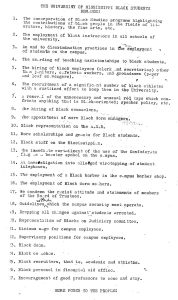
“To get a faculty of color at the university,” Cole recounted. “To get a person of color to be in athletics on the football team and the basketball team. To get the university to disassociate with the symbols that people threw in our face as a way to tell us that we were not welcome here.”
After the demands for the administration and the sit-in, BSU gathered on Feb. 25 to protest at an Up with People performance in Fulton Chapel.
After BSU entered the event, took over the stage and exited, they were met by highway patrolmen who arrested 89 students. Eight were eventually expelled, including Cole.
In the aftermath, Cole recalled being devastated and worried about disappointing his family and church community who had supported him despite having grave concerns about him attending the university.
Cole eventually returned to UM for his Ph.D. after completing his undergraduate degree at Tougaloo College, which reached out after learning about the students’ plight and offered them admission, and masters degrees from State University of New York and the University of Michigan.
In 2020, five of the eight students who were expelled from the university were invited back for two days during the 50th anniversary of the event to share their experiences.
Patricia Brassel
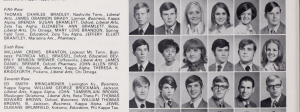
Another student at UM during the time that Cole was an undergraduate was Patricia Brassel, who went on to become the first African American music education graduate and a long-time music teacher.
After the protests, Brassel recalled that a second group met to try and figure out how to get their friends and classmates out of jail.
“I remember walking by the sheriff who was on his way to arrest the rest of friends who were simply trying to figure out a way to get the others out of jail,” Brassel said. “That was very disheartening for us. I have some friends who, one in particular, would just not come back to this campus because she has no love for the place.”
Aside from the 1970 protests, Brassel has her own story about coming to UM. An Oxford native and part of the last graduating class of Central High School before the desegregation of Oxford’s schools in February 1970, Brassel was a young witness to the integration in 1962.
Brassel’s mother was a teacher in Oxford. On their way to Central High School they were stopped by the National Guard at Roadside Park, now the Chamber of Commerce. Due to the riots at the university, they had to sit there all day until they could go home.
“(My mother) decided that day, that after James Meredith entered the University of Mississippi, that this was where I was going to school,” Brassel said. “I wanted to go to Tougaloo College, but my mother decided James Meredith had gone through all of this and I was going to the University of Mississippi.”
Brassel’s experience as an African American woman
But before Brassel entered the University of Mississippi, there were other African American women who paved the way.
People like Joyce Watson, Laura Croft Jordan, Eunice Burt, Alice Hillard Buford, Nola McKee Leggett and Verna Bailey, who graduated in 1968, are cited as the first African American women to graduate from the university.
As to her personal experience, Brassel echoed Cole on some things, but also noted the unique experiences as an African American woman on campus.
“Being a woman and African American may have given us, I hate to call it, a double dose of not being accepted,” Brassel said.
Brassel talked about figuring out how to join Greek life since there were no sororities on campus that would allow African Americans to join them until the incorporation of the Theta Psi Chapter of Alpha Kappa Alpha Sorority, Incorporated on May 12, 1974.
“A group of us got together, and we decided that we’ll just go and see what the procedure is for joining one that’s already here,” Brassel said. “We asked them that procedure, and so the answer was we would just love to have you all, but our charter says that you have to be of European descent.”
Brassel had the opportunity to join the Lambda Sigma Chapter of Delta Sigma Theta Sorority, Incorporated after she graduated, but didn’t take it at the time and cited it as something she wished she had done.
Brassel talked about her challenges, but she also said that she does not regret going to UM and that the good experiences outweigh the bitter ones. Brassel talked in depth about some of the staff members at UM that improved her experience.
“I met many wonderful people at the University of Mississippi. One of my greatest influences at the university was Dr. Gloria Kellum. She was over speech pathology,” Brassel said. “As a high schooler and during my formative years in school, I had a severe stutter. I was doing speech therapy at the university because at Central High School we didn’t have a speech therapist. This lady was a great influence in my life, and I still keep in touch with her today.”
She also noted that Jeanette Jennings, the first African American faculty member, was a great influence on her as well as the Rev. Wayne Johnson, who founded the Oxford Development Association.
Cole, when asked to recall African American leaders on campus at the time, also mentioned Johnson and noted the presence of older African American law students who helped in the formation of the Black Student Union.
Integration at the law school
The University of Mississippi School of Law also has its own important history in terms of integration.
After the university fought his admission, Cleve McDowell filed a lawsuit and entered in June 1963. According to the story told in Frank Lambert’s article “The Black Student’s Who Followed in the Footsteps of James Meredith at Ole Miss,” McDowell roomed with James Meredith and had a relatively smooth summer experience, but fall of 1963 told a different story.
McDowell bought a car from Meredith, whose vehicle was well known to segregationists. People threw things at the car and occasionally forced McDowell off the road, Lambert said.
After McDowell was denied protection by the university, McDowell purchased a gun to keep in his car for protection.
Knowing the possession of a gun was prohibited on campus, and fearing police might find it if he left the car in a no-parking zone, McDowell tucked the gun in his pocket one day. On his way to class, the gun clattered out of his pocket, and two law students who saw the gun reported it to the Lafayette County sheriff. The next day, McDowell was expelled from the university.
Reuben Anderson
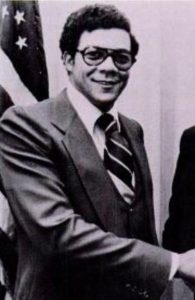
Photo Courtesy WikiMedia Commons
The first African American student to graduate from the law school, although he was not there to give advice to the students of Cole and Brassel’s time, was Reuben Anderson. He graduated in 1967.
Anderson, who went on to become the first African American justice on the Mississippi Supreme Court, entered law school with the hope of becoming a civil rights lawyer, following in the footsteps of his mentor, Jack Young.
Young, whose house Anderson said he grew up in, was one of the few lawyers in Mississippi willing to take on civil rights cases.
Anderson was advised by Young to attend UM’s law school because of the diploma privilege that it offered, meaning you didn’t have to take the bar after graduation. Anderson described African Americans taking the bar as an iffy situation in the 1960s.
“It was totally a discretion of the bar commission as to who they would admit,” Anderson said. “They would admit as few Black lawyers as they could.”
Initially, Anderson was rejected from the law school due to a recommendation requirement.
“My application needed five graduates of the law school to sign for me, and I couldn’t make that, so I was rejected,” Anderson said. “The following year the law school changed that ahead of the new dean Josh Morse. He reached out to me and asked if I still wanted to attend law school. I did, and he told me that if I decided to come, he would give me a scholarship.”
Talking about his experience in Oxford, Anderson reflected on hardships.
“Oxford was totally and completely segregated, so if we went anywhere, all of us went together, and all of us were harassed together,” Anderson said. “Those two years I spent in Oxford were two years I tried to put out of my life, trying to remember as little about it as I could.”
Despite those hardships, Anderson also expressed appreciation for the university that is rooted in his unique perspective on Mississippi.
“Had it not been for Ole Miss, I would not be a lawyer,” Anderson said. “I grew up in Mississippi in the ‘40s and ‘50s. Mississippi was different then. Everything in Mississippi was segregated. I’ve seen Mississippi make enormous changes. If I had to give students anywhere advice, I would just say please stay in Mississippi, we need you.”
Closing reflections
Anderson, Cole, Robinson and Brassel all gave their unique perspectives on the university in their closing remarks.
Cole, when asked why he returned to the University of Mississippi after so many years, said that was the golden ticket question.
“I spent my career here at the University of Mississippi, and I could have easily spent it elsewhere,” Cole said. “If I had to do it all again, I’d do the same. I’ve always loved the institution, and I’ve always fought for its betterment and will continue to do the same.”
Cole also said that the university has to recognize other people who were dispelled from the university, such as professors who were pushed away as a result of their support for the integration.
“We have to recognize them and recognize the meaning of any university or institution,” Cole said. “We are a great, American, public university now, and that would’ve never happened had it not been for brave individuals like James Meredith.”
Robinson, who has spent time in K-12 education as well as time at the university as a professor, noted the importance of educating people about the entirety of the Civil Rights movement. The movement looks different in different places across the nation, Robinson said. It’s not just Martin Luther King Jr. and Rosa Parks.
Pertaining to UM in particular, Robinson noted that faculty and administrators such as Shawnboda Mead, vice chancellor for diversity and community engagement, and EJ Edney, assistant vice chancellor for diversity and inclusion, are working to incorporate holistic education about the history of integration, filling the gaps that she mentioned in the beginning of her interview.
“There’s a huge gap between James Meredith and everyone else that contributed to the university being integrated,” Robinson said. “They are doing a fantastic job of bringing us all together to make sure that these things are showing up across the university and not just in one single class.”
Brassel, also an educator, said that as a music teacher she would make sure that her students performed with students of other cultures.
“Teaching in an inner-city school, which was mostly African American, I made sure that my students were prepared to perform with students of other cultures,” Brassel said. “It was important to me that they experienced more than performing.”
Brassel made sure to echo Martin Luther King Jr. with the statement that she judges people by the content of their character and not the color of their skin, and she ended with a note of reclamation, citing a phrase that was once used to drive away African American students at the time of her attendance.
“At the time, kids were wearing tags on their cars that said, ‘Love Ole Miss or Leave It.’ That was the response to grievances,” she said. “Now, I see young African American students who can say, and I can say it too, that we just love Ole Miss. I think we kind of set the stage for that.”
